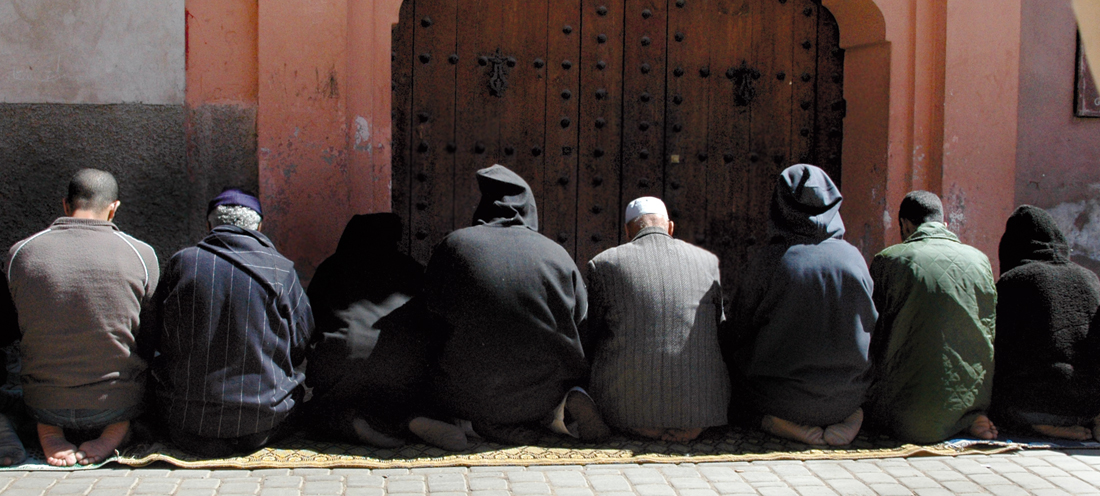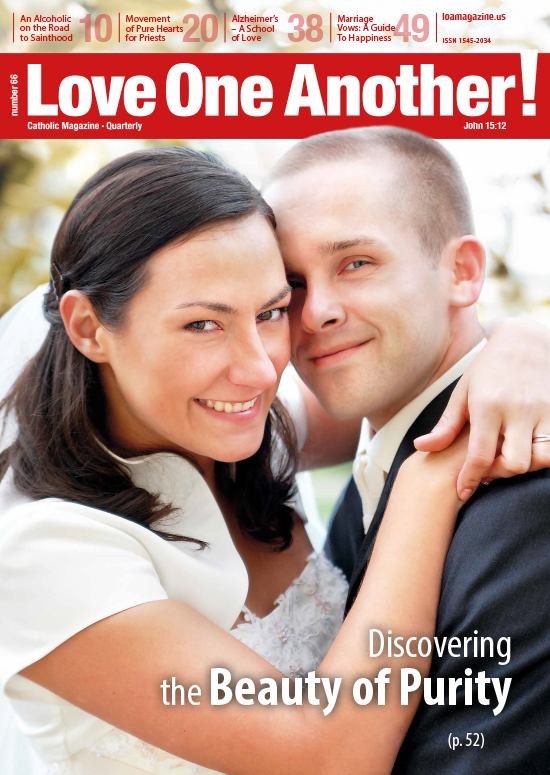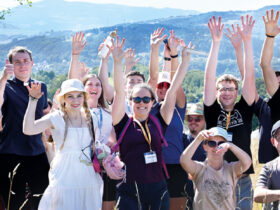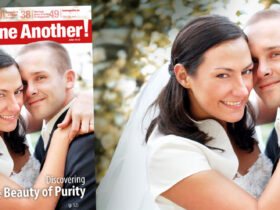Apostle of the Muslims

The message of the Gospel remains always in force and is intended for all nations; however, there are regions of the world where the teachings of Christ encounter obstacles and even open hostility. To these regions belong, above all, the Muslim countries.
Apostasy from Islam is normally punishable by death, if not on the strength of the laws of the land then at least on that of the Shariat, a code of laws based on the Koran, which every Muslim is bound to obey. Most of these countries also mete out harsh punishment to those who are bold enough to preach the Christian faith. Nevertheless, despite these restrictions, the teachings of Christ draw more and more adherents of Islam every year. Risking their social position, financial security, health, and even their lives, large numbers of Muslims seeking the Way, the Truth, and the Life convert to Christianity.
Among those who has experienced the grace of conversion is Rashid al-Maghribi. He was born in 1971 in Morocco into a devout Muslim family. His father, grandfather, and uncle being imams, young Rashid came into contact with the Koran from an early age. He knew many parts of it by heart, as well as numerous Muslim prayers. If he had not come to hear about Christ from radio broadcasts, no doubt he too would have assumed a clerical office in one of the mosques of Casablanca (Arabic: ad-Dar al-Bayda’) where his family lived. Rashid was then sixteen years old. His young mind developed a keen interest in the person of the Master of Nazareth. The interest soon became a fascination. He began to seek information about Christianity and to compare the Bible with the Koran. After four years of inner struggle, he was completely won over by the Good News. The event became a turning point in this life. As he would later recount, “Jesus touched my heart and transformed me completely.”
Rashid converted in 1990 at the age of nineteen. For fifteen years, like most Moroccan Muslims who renounce Islam and “go over” to Christ, he kept the fact a secret. He spent this time translating and distributing copies of the Bible. In 2005, fearing for his life, he left Morocco and sought asylum in the United States. There he began a more active evangelizing campaign aimed at his former co-religionists. He won distinction for his two ongoing programs, Kashf al-Kina’ (Removing the Mask) and Su’al Jari (Bold Questions) which are broadcast on the satellite TV station al-Hayat (Life) and in which he presents various problems touching Islamic doctrine and Christianity. These weekly programs, prepared with notable honesty, draw millions of Muslims to discover the true faces of Christianity and Islam, which differ so greatly from what they are fed by their Muslim clerics.
The evangelical work of Rashid al-Maghribi as well as other missionaries, notably Fr. Zakaria Butros, is highly effective. In recent years, millions of Muslims in southern Africa and the Middle East have avowed Christianity. Their precise number, given the harsh punishment meted out to apostates from Islam by both secular and Sharia law, escapes the statisticians. It is estimated that in Morocco around 150,000 people have converted to Christianity, while their number in Egypt may be as high as two million. Already in 2003, Muslim clerics were complaining on the famous Arabic TV station al-Jazeera that in Africa alone around six million Muslims were abandoning Islam every year. Clearly, there is a great hunger for Christ’s teaching in the countries lying in the shadow of the Crescent.
A decisive factor in Rashid’s conversion was his comparative study of the Koran and the Bible. As a son of an imam and prospective candidate for the Muslim clergy, he was perfectly conversant with the holy book of Islam. He was well aware that official doctrine held the Koran to be uncreated and eternal. To describe the special character of the book, Muslims use the term i’jaz—i.e. perfection, miracle, inerrancy in every respect. Yet when Rashid began to study the Koran and compare it with the Christian Bible, he discovered a host of historical and linguistic errors. In 2009, he published his reflections in a book titled I’jaz al-Qur’an (The Inerrancy of the Koran). The work represents a synthesis of the final steps of his conversion and the doubts he encountered along the way. He points this out clearly in his introduction where he states that what bound him most strongly to Islam at the time was his belief in the miraculousness and inerrancy of the Koran. However, his analysis of various parts of this book convinced him that many of the Koranic accounts were clearly based on Biblical historical events and even ancient Christian legends, although these were frequently modified and fitted to the current political and religious needs of Islam in the making. Other accounts of the Koran clearly revealed the author’s ignorance of historical and geographic facts. All this invalidated the Islamic dogma, which claimed that what Mohammed said was more perfect and more reliable than all the other existing sources of information. According to Muslim theology, the veracity of every detail contained in the Koran was the main proof substantiating the authenticity of the Prophet’s message.
Convinced of the groundlessness of the Koran’s claim to being the revealed word of God and aware that the vast majority of Arab Muslims were ignorant of the true meaning of the contents of this book, this for the simple reason that they did not understand it (the classical Arabic of the Koran compares to modern Arabic dialects more or less as does Latin to modern French or Spanish), Rashid felt prompted to translate large portions of the Koran into the Moroccan dialect and have it posted on Youtube. Needless to say, this evoked a storm of protest from the Muslim clergy.
Indeed, Rashid’s activity evokes considerable controversy in the world of Islam. In addition to the testimonies of conversion he receives during his programs, he receives insults and threats. Yet these do not deter him from redoubling his efforts to acquaint his former co-religionists with the salvific message of Christ. Besides, he never claims that Muslims are bad people. The problem is not with people but with the ideology of Islam. Muslims, in his words, are “victims of Islam.” Thus they stand in need of someone who can help to free them from bondage and fear.
In most cases, the Muslim’s knowledge of Christianity is woefully inadequate. One of the most widespread errors among the adherents of Islam is that the Christian Trinity (i.e. Holy Trinity) consists of God the Father, Christ, and Mary (or even the Archangel Gabriel). In presenting the person of Jesus, Muslim clerics rely solely on altered fragments of the Gospel. They refuse to acknowledge Him as the Son of God and deny He died on the cross. Thus the average Muslim’s notion of the Good News is fundamentally false. Moreover, they accuse Christians of leading immoral lives, a view they base more often than not on examples taken from Hollywood films.
Thus there lies before Rashid—as indeed before every Christian whom Baptism enjoins to proclaim the Gospel—a great harvest. What part can we play in it?
First of all, let us remember in prayer our Christian brothers and sisters living in the Muslim countries. They belong to many Churches, but all are joined in faith with the One Lord Jesus Christ, true God and true man. Their very presence in societies, which are often hostile toward them, is itself a form of evangelization. Let us pray for those who undertake as missionaries the difficult task of proclaiming Christ to the followers of Islam. Let us also surround with our prayers those Muslims, who despite the threat to their lives have confessed Christ as their Savior, but must hide their faith, just as the ancient Christians did in the Roman catacombs. Let us as much as possible engage in charitable actions aimed at bringing aid to Christians of the Middle East and Africa who often suffer as a result of wars, persecution, and poverty.
The evangelization of the Muslim countries is also accomplished through our own deepening of our relationship with Christ and the Church. It must be a bitter reproach for many Christian families in Europe and the Americas that do not read the Bible or even have a copy at home that there exist regions in the world (e.g. Saudi Arabia) where the very possession of the Holy Scriptures can land one in jail. The same applies to attending Holy Mass, availing oneself of the Church’s sacramental helps, one’s conduct of life. The tepidity of faith of many Christians, their lack of appreciation of the treasure they possess and, worse still, their open opposition to the teaching of Christ—all this undoubtedly delays the moment of a Muslim’s encounter with the Church.
Siman Sarjis






